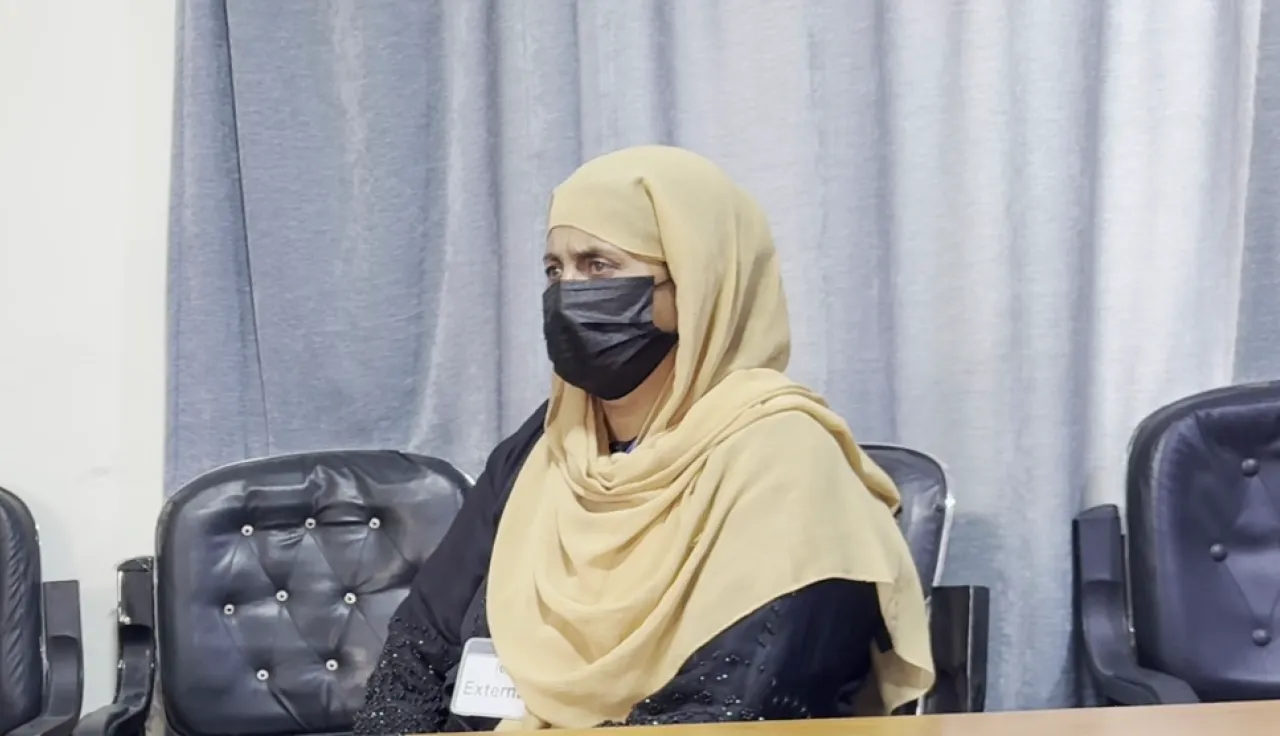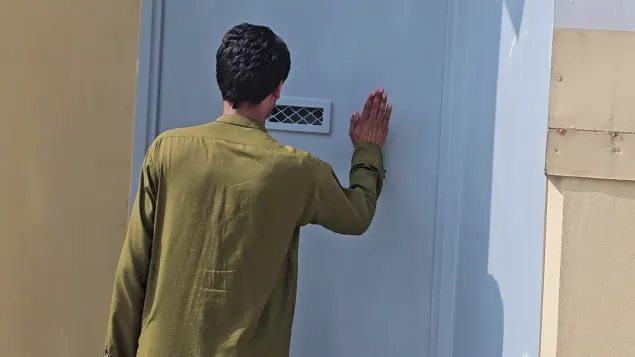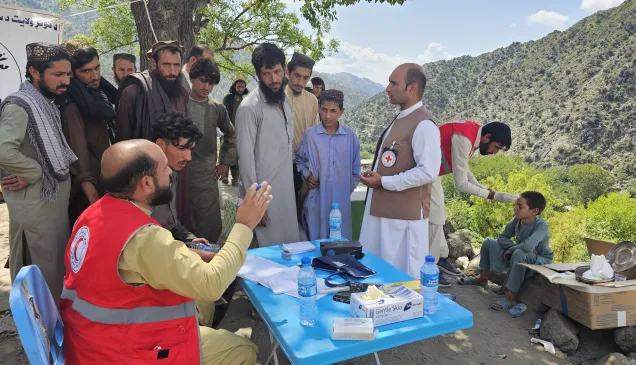Afghanistan: Two families reconnect with missing loved ones through Restoring Family Links services

A mother’s journey from loss to reunion:
Life has been a series of intense challenges for Aziza*, a woman from Kabul. Several years ago, she lost her husband to the armed conflict in Afghanistan and was left as the sole provider for her three children, two sons and a daughter. Determined to give them a secure future, Aziza accepted her brother’s invitation to migrate to a neighbouring country.
But that journey brought another devastating blow. After crossing the borders, her eldest son, who was only 16 at the time, disappeared without a trace. “I searched everywhere for him. Losing my eldest son felt unbearable, especially after I had lost my husband,” she recalls, as emotions surge.
Despite searching desperately and raising countless inquiries, Aziza could not find her son. As hope of reuniting faded, she eventually returned to Kabul with her remaining children. Life at home was a daily struggle and Aziza worked in neighbours’ homes as a cleaner to pay rent and feed her children.
One day, a neighbour who heard Aziza’s story told her of Trace the Face website and the International Committee of the Red Cross (ICRC) helping to search for missing people. That piece of information opened a new chapter of hope for her.
Aziza shares that Khairullah, her neighbour, played a pivotal role in searching for her son again.
My wife told me about Aziza’s missing son. It reminded me of a friend who knew about a website for finding missing loved ones. We sent a photo of Aziza’s son to my friend, who helped to spot him on Trace the Face website,
says Khairullah.
![ICRC staff member Noor Wali Zadran [right] talks with Aziza [centre] and her neighbour, Khairullah [left]](/sites/default/files/styles/desktop_image/public/2025-09/AFG_PFL_Success_01.jpg.webp?itok=uY7l_rMZ)
ICRC staff member Noor Wali Zadran [right] talks with Aziza [centre] and her neighbour, Khairullah [left]
Together, they went to the ICRC’s office in Kabul. Noor Wali Zadran, an ICRC staff member who helps with tracing and reuniting separated family members, says, “We verified Aziza’s son’s photo on the website, noted the reference number and completed the required forms. Within ten days, we found out that her son was living in a European country and wanted to reconnect. Restoring contact between separated loved ones is much more than just facilitating a phone call. It’s a line for restoring hope, healing wounds and giving families a reason to live again.”
That moment of healing came on an ordinary afternoon for Aziza while she was working at home. Khairullah’s wife came knocking at their door with his phone. “My son was on the line. I don’t have a phone and was hearing my son’s voice for the first time in almost ten years. It was overwhelming. Tears of happiness poured down my face. I couldn’t believe it was him,” says Aziza.
Since that day, Aziza and her son have stayed in regular contact, sharing laughs, worries and ordinary details of life that had been lost for so long.
Reunited after two years of silence:

Nader knocks on the gate of the ICRC’s office in Jalalabad city, Nangarhar Province
Visiting ICRC’s office in Jalalabad, Nader, who is from Lagharjo village in Kot district of Nangarhar Province, recalls a journey marked by separation, fear and finally relief. Two-and-a-half-years ago, his brothers Zahir Shah and Saznoor left Afghanistan together. But somewhere in Iran, their paths diverged. While Zahir eventually made it to Europe, Saznoor disappeared without a trace.
Zahir shared his story with friends in Belgium, who urged him to contact the Red Cross Society as it helps reunite families separated by armed conflict, migration or disaster. Following their suggestion, Zahir approached the Belgian Red Cross Society and filed a tracing request for his missing brother.
The Belgian Red Cross shared the tracing request with the ICRC in Afghanistan which was subsequently shared with the Afghan Red Crescent Society (ARCS). ARCS staff memebers visited Saznoor’s home in his village where they met with his family members and found that he had managed to return home. A Red Cross message, handwritten letter with brief family news, was collected and shared with Zahir in Belgium, relieving his anxiety over whether his brother was safe and well.
![Nader [right] with an ICRC staff member at the ICRC’s office in Jalalabad, Nangarhar Province](/sites/default/files/styles/desktop_image/public/2025-09/AFG_PFL_Success_03.jpg.webp?itok=SiknndxX)
Nader [right] with an ICRC staff member at the ICRC’s office in Jalalabad, Nangarhar Province
Life feels empty when you don’t know whether your loved one is alive or dead. Thanks to the ICRC, we were able to connect with Zahir and put him out of his misery of not knowing,
says Nader, adding that he tells other families in the village to contact the ICRC to trace their missing loved ones.
Trace the Face is a Red Cross and Red Crescent website which helps migrants and their families reconnect. Developed in 2013, the website is designed to support families who have lost contact with their loved ones during migration because of conflict, violence or natural disaster. People who have lost contact with their loved ones can post pictures of themselves on the virtual photo gallery for their relatives to identify them and find a way to restore contact. In case someone identifies a photo of a loved one, the ICRC initiates the reconnection process.
There are currently 7,341 photos uploaded on Trace the Face website, of which 1,971 – more than a quarter – are pictures of Afghans who are looking for their missing family members. Many families are separated along the migratory route and do not know how to restore contact with their loved ones.
Anyone searching for relatives missing because of conflict, migration or disaster can approach the nearest ICRC or Red Cross or Red Crescent Society offices to receive guidance and help.
The ICRC and National Red Cross and Red Crescent Societies work together around the world to locate people and put them back in contact with their loved ones through our Restoring Family Links (RFL) services. This includes looking for missing people, restoring contact between separated family members, reuniting families and seeking to clarify the fate and whereabouts of those who are still missing.
If you are trying to find a missing relative, visit our website or use Restoring Family Links (RFL) hotline, +93729140641.



